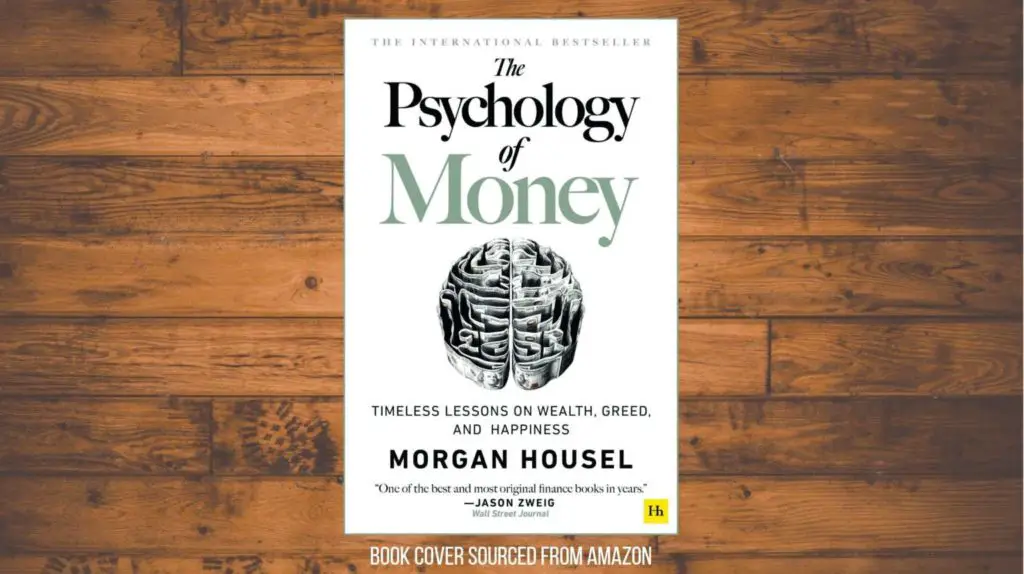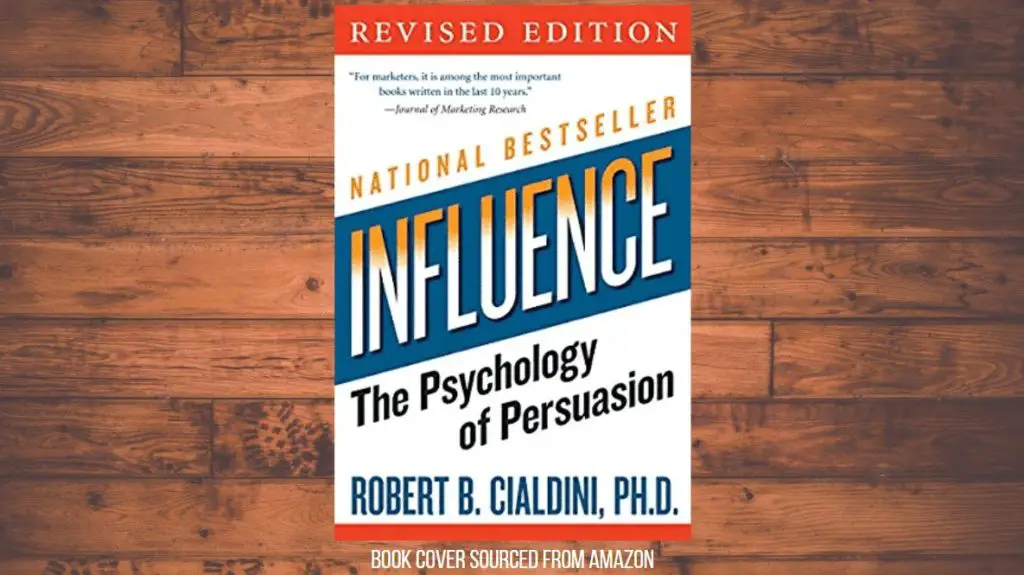This post may contain affiliate links, which means I’ll receive a commission if you purchase through my links, at no extra cost to you. Please read full disclosure for more information.
ABOUT
- Title: The Psychology of Money
- Sub-title: Timeless lessons on wealth, greed, and happiness
- Author: Morgan Housel
- About the author: Morgan Housel is currently a partner at the Collaborative Fund. He was once a columnist at The Wall Street Journal and The Motley Fool. Morgan speaks to groups and at conferences across the world about behavioral finance and history.
- Pages: 256
- Published: 2020
- Link to book
HIGH-LEVEL SUMMARY
The Psychology of Money aims to convince the reader that soft skills are more important than the technical side of money. Overwhelmingly, investing and personal finance are taught as math-based fields. Analyzing data, history, and trends help with making optimal decisions.
However, humans rarely follow what is listed on a spreadsheet.
If we know debt and high interest rates are bad, why do a majority of us bury ourselves in debt? Why do we sell at the bottom of a market and buy at the top even though this is the opposite of what is taught? Why do we still live paycheck to paycheck when we have had raises for the past several years?
It’s due to the psychology of money. Morgan Housel wrote this book to show that doing well with money has little to do with how smart you are and a lot to do with how you behave.
Investing and personal finance is an industry where someone with no college degree, no training, no connections, and no background can outperform someone who has all of those things.
This is demonstrated in the book with a story shared of a man that was a janitor who lived in a house that he bought for $12,000 yet died with $8 million in wealth. He simply did the little things correctly over a long period of time.
Topics covered in the book include:
- The factors of luck and risk
- Why enough is never enough
- The extraordinary impact of time and compounding
- Getting wealthy vs staying wealthy
- How you can be wrong half the time and still make a fortune
- Why you need room for error for inevitable surprises
- Why risk and volatility is the fee of admission to investing success
- The importance of knowing your financial goals and desires will change
- Why pessimism is more seductive than optimism
RECOMMENDATION
There are hundreds of books on personal finance and investing. After a while, they all begin to sound the same. The Psychology of Money was a fresh read that I would recommend to anyone.
Rather than writing about what you should do to optimize your finances and returns, author Morgan Housel breaks down the psychological component of money.
Not many books dive into this topic, so I highly recommend you read this. It will open your eyes to the behaviors and actions you take with your money and why you do so. You’ll gain awareness and will learn how to navigate your psychology.
Saving, investing, and achieving financial freedom are simple if you do a few things correctly. However, human nature and cognitive biases prevent us from effectively doing those few things correctly. Instead, they lead us to actions that shoot ourselves in the foot.
If this book interests you, you will enjoy these other personal finance books I have reviewed as well:
- Book Review: The Path by Peter Mallouk and Tony Robbins
- Book Review: Financial Freedom by Grant Sabatier
- Book Review: I Will Teach You To Be Rich by Ramit Sethi
TOP 20 TAKEAWAYS
- In no particular order
1. A genius who loses control of their emotions can be a financial disaster. The opposite is also true. Ordinary folks with no financial education can be wealthy if they have a handful of behavioral skills that have nothing to do with formal measures of intelligence.
2. We are taught about money in ways that are too much like physics (with rules and laws) and not enough like psychology (with emotions and nuance).
3. Your personal experience of money makes up maybe 0.00000001% of what’s happened in the world, but maybe 80% of how you think the world works. We go through life anchored to a set of views about how money works that vary wildly from person to person.
4. Luck and risk are both the reality that every outcome in life is guided by forces other than individual effort. If you give luck and risk their proper respect, you realize that when judging people’s financial success—both your own and others’—it’s never as good or as bad as it seems.
5. The hardest financial skill is getting the goalpost to stop moving. You need to know when you have enough or you will forever keep chasing.
6. If you want to do better as an investor, the single most powerful thing you can do is increase your time horizon. You’ll want to aim for pretty good returns that you can stick with and which can be repeated for the longest period of time. That’s when compounding runs wild.
7. Good investing is not necessarily about making good decisions, it’s about consistently not screwing up. A combination of frugality and paranoia helps you to not screw up.
8. Getting money requires taking risks, being optimistic, and putting yourself out there. But keeping money requires the opposite of taking risks. It requires humility, and fear that what you’ve made can be taken away from you just as fast.
9. The tail ends of distributions have an outsized effect in areas of life. Long tails—the farthest ends of a distribution of outcomes—have tremendous influence in finance, where a small number of events can account for the majority of outcomes.
10. Over the course of your lifetime as an investor, the decisions that you make today or tomorrow or next week will not matter nearly as much as what you do during the small number of days—likely 1% of the time or less—when everyone else around you is going crazy. Your success as an investor will be determined by how you respond to punctuated moments of terror, not the years spent on cruise control.
11. “It’s not whether you’re right or wrong that’s important,” George Soros once said, “but how much money you make when you’re right and how much you lose when you’re wrong.” You can be wrong half the time and still make a fortune.
12. The highest form of wealth is the ability to wake up every morning and say, “I can do whatever I want today.” If there’s a common denominator in happiness—a universal fuel of joy—it’s that people want to control their lives.
13. No one is impressed with your possessions as much as you are. There is a paradox here: people tend to want wealth to signal to others that they should be liked and admired. But in reality those other people often bypass admiring you, not because they don’t think wealth is admirable, but because they use your wealth as a benchmark for their own desire to be liked and admired.
14. Personal savings and frugality—finance’s conservation and efficiency—are parts of the money equation that are more in your control. Income may or may not be in your control.
15. Academic finance is devoted to finding the mathematically optimal investment strategies. My own theory is that, in the real world, people do not want the mathematically optimal strategy. They want the strategy that maximizes for how well they sleep at night.
16. It’s dangerous to rely too heavily on investment history as a guide for the future because: 1) You’ll likely miss outlier events that will happen. 2) Using history as a guide does not account for structural changes relevant to today’s world.
17. Leave room for error. The most important part of every plan is planning on your plan not going according to plan. Room for error lets you endure a range of potential outcomes, and endurance lets you stick around long enough to let the odds of benefiting from a low-probability outcome fall in your favor.
18. Long-term planning is harder than it seems because people’s goals and desires change over time. Avoid the extreme ends of financial planning and accept the reality of our changing minds. The more extreme your past decisions were the more you may regret them as you evolve.
19. Everything has a price, but not all prices appear on labels. The price of investing is risk and volatility. Thinking of market volatility as a fee rather than a fine is an important part of developing the kind of mindset that lets you stick around long enough for investing gains to work in your favor.
20. Beware taking financial cues from people playing a different game than you. When investors have different goals and time horizons—and they do in every asset class—prices that look ridiculous to one person can make sense to another. Being swayed by people playing a different game can also throw off how you think you’re supposed to spend your money.
WHAT I LIKED

Points out common behaviors, thoughts, and emotions with money
Behavioral finance is a relatively new field, but focus has been growing on how individuals think about money and investing. This book will point out how humans behave and think about money, which I believe is a necessity for financial literacy.
Structure of the book
The book has about 19 chapters that discuss different topics on the psychology of money. In addition to that, the author includes one chapter on how he thinks about his own money and what he does that works best for him.
The final portion of the book is a postscript describing the history of the U.S. consumer. The two latter portions made a good book even better.
Use of stories and examples demonstrate points
The author uses stories and examples to support his statements. For example, to demonstrate how the tail ends of distributions are impactful, Morgan talks about how the venture capital industry and companies like Amazon and Netlfix chase the tails to drive success.
It’s nice to relate the statements to actual examples and proof.
BENEFITS TO YOUR LIFE AND CAREER

Become aware of the human blind spots and pitfalls
You don’t know what you don’t know. When it comes to money, you may think you are doing everything you need to do, but that could be far from the truth.
By reading this book and becoming aware of blind spots and pitfalls, you can correct what you are doing with your money and prevent any derailing behaviors and situations from occurring.
Increase your odds of having financial freedom
By applying what you learn in The Psychology of Money, you can greatly increase your odds of achieving financial freedom. Simply not screwing up can amplify those odds.
Morgan Housel will point out the many ways you can screw up your money. When you read the examples and stories, you’ll make sure you won’t make the same mistakes.
Increase your odds of being fulfilled
One thing about money is that most people feel like they never have enough of it. Lifestyle inflation is a big part of this. As someone’s income rises, their standard of living rises. Their Toyota sedan is no longer enough for them. Now they need the BMW.
The Psychology of Money will teach you the importance of knowing when enough is enough. By controlling your emotions, thoughts, and behaviors, you can find fulfillment with what you currently have.
When you maintain a simple standard of living as your income grows, you will create a large financial cushion that will bring peace of mind when turbulent times come.
10 ACTIONS YOU SHOULD TAKE
1. Save and invest as early as you can. Let time work in your favor.
2. Realize that your goals and desires are different from those around you now and those in previous generations. As a result, beliefs, financial goals, and desires are different between everyone. Do what is best for you.
3. Focus less on specific individuals and case studies and more on broad patterns. Luck and risk play too big of a factor to focus on individuals and mimic what individuals do.
4. Don’t continually compare yourself financially to others. You will never have enough and the goalpost will keep moving.
5. Outlier events will happen (ex: financial crises, coronavirus, etc). Leave room for error in your financial planning so you can weather these storms.
6. Become OK with a lot of things going wrong. You can be wrong half the time and still make a fortune.
7. When planning, realize that the common denominator for happiness in life is the sense of control you have on your life. Shoot for goals that will help you feel in control and do what you want.
8. Don’t buy possessions to impress other people. Odds are that they aren’t admiring you, but are picturing themselves with the possession you are flaunting.
9. You don’t need to do everything optimally with your finances and investing. Do what helps you sleep at night. Be reasonable vs completely rational.
10. Avoid the extreme ends of financial decisions. Everyone’s goals and desires will change over time, and the more extreme your past decisions were the more you may regret them as you evolve.
RESOURCES
The Psychology of Money can be found on Amazon at this link here if you are interested in reading.



